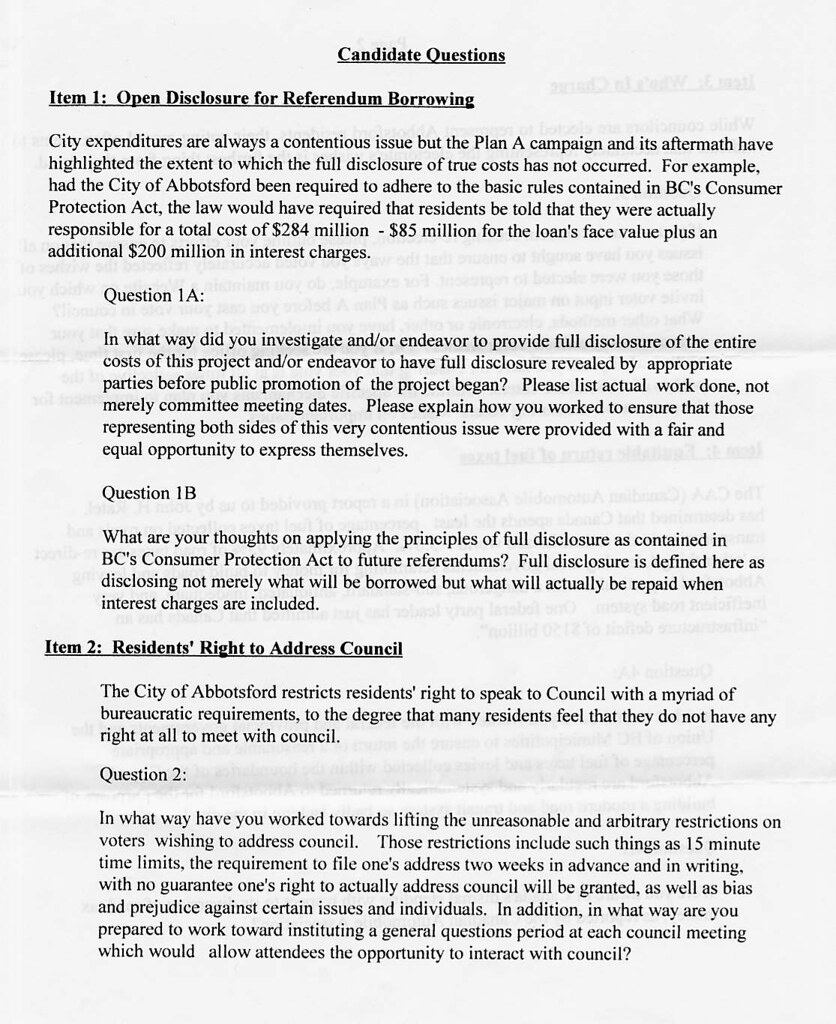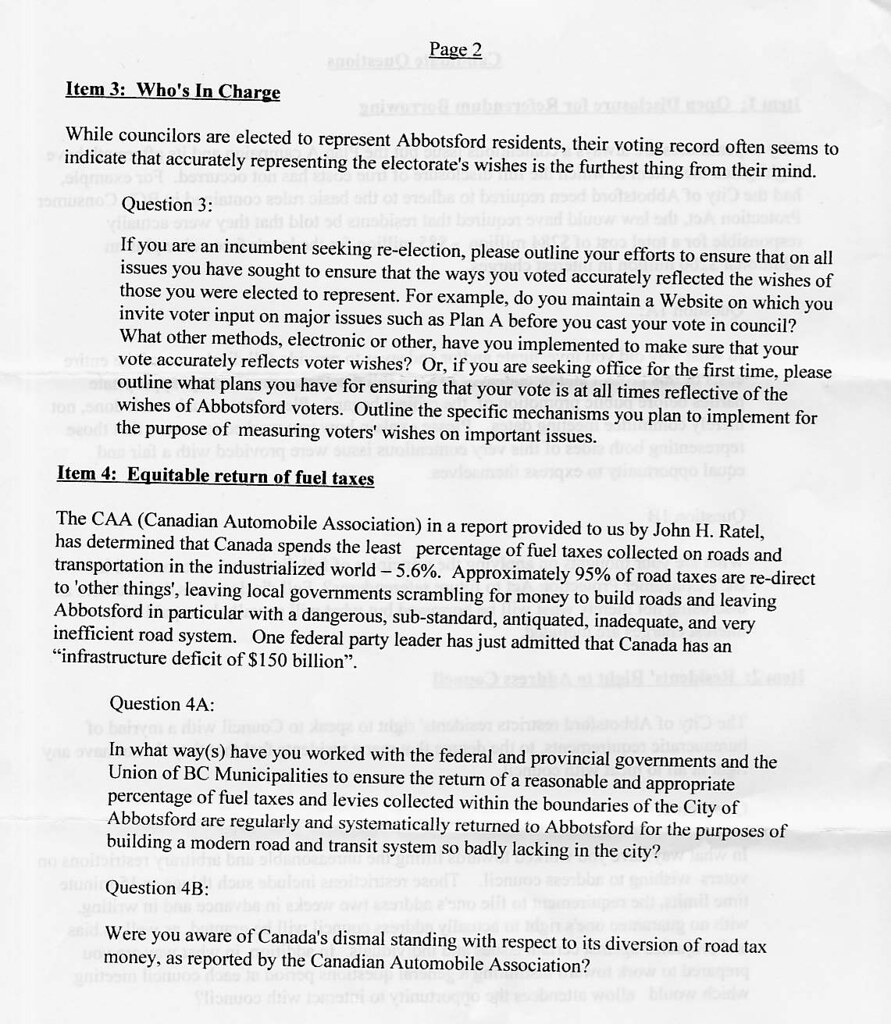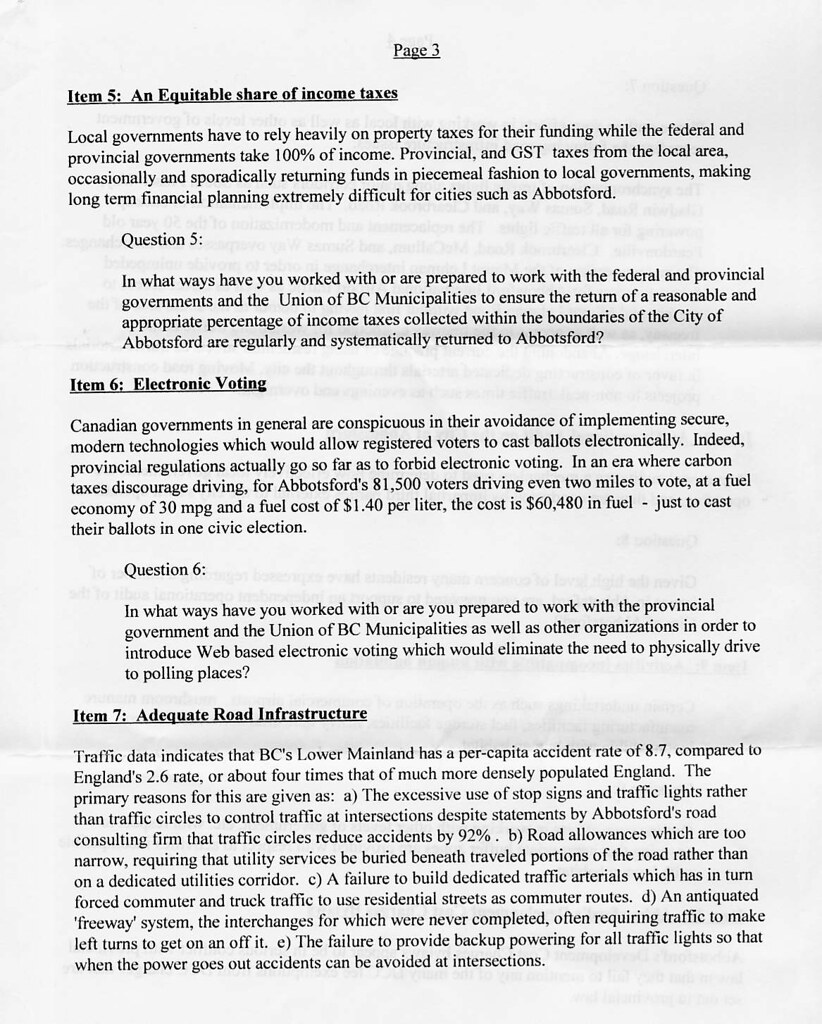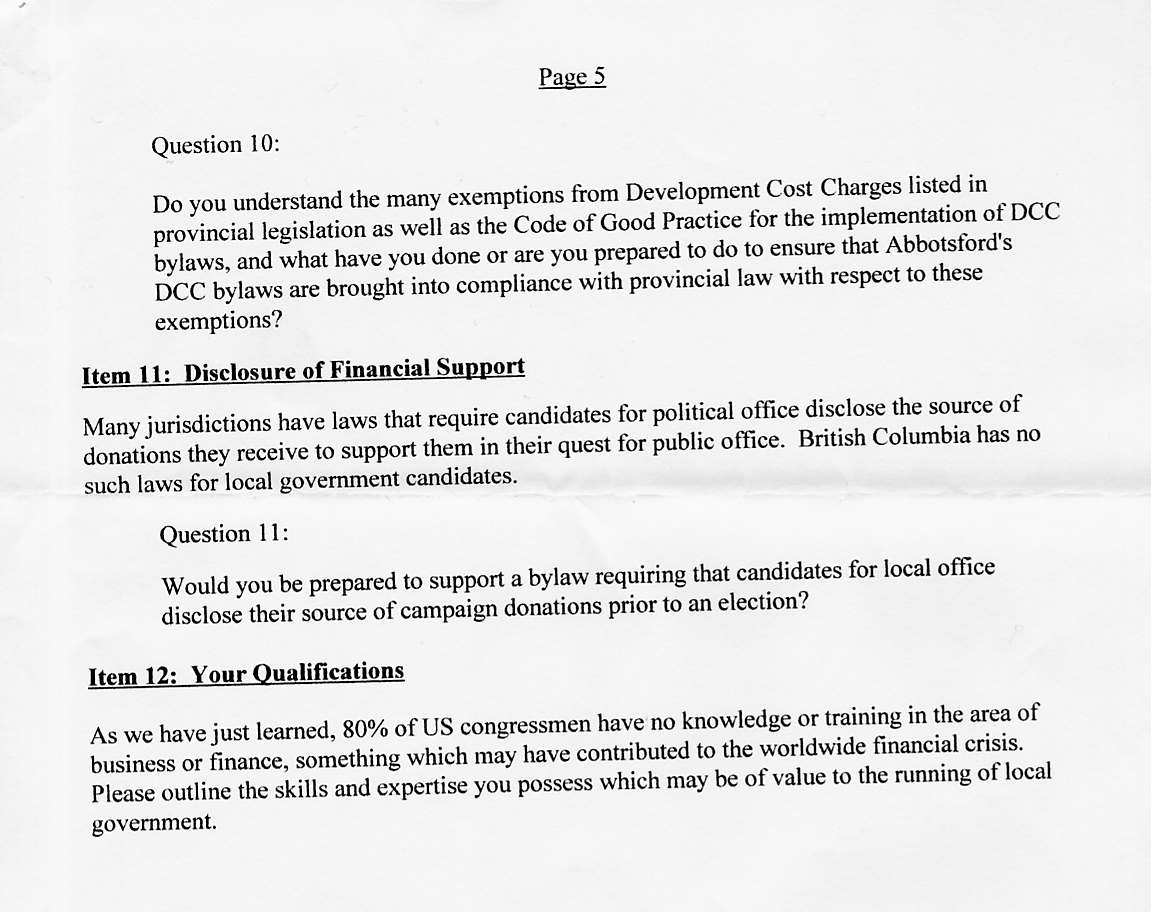




Question 1A:
I was a strong and vocal opponent of Plan A attending all public information meetings, asking questions of City councillors and staff, speaking with the public at the meetings, writing to the news paper and writing on www.homelessinabbotsford.com.
I filed a complaint with the BC Ombudsman over the City’s behaviour in conducting the referendum and wrote to our provincial elected officials (MLAs, premier, ministers) concerning the City’s conduct during the referendum.
I was a member of the board of directors of the ratepayers association during its first year of life and have continued to write and ask questions on the costs, the management and the effect of Plan A on the public.
Question 1B:
Since several of the articles and letters that I wrote referenced the need to consider interests costs when talking of making “profits” I clearly consider interest costs to information to be considered.
If the public wants to know how much interest the City will pay in addition to the repaying the principal, that information should be provided.
Question 2:
Speaking of unreasonable and arbitrary, what about the tone and content of this Question?
I have never been on council, but I have been a vocal and active opponent of council and wrote/complained about the way the Plan A referendum was handled.
However I would have to say that reasonable restrictions on making presentations to council are not unreasonable nor a barrier to addressing council. For example: the 15 minute time limit cited in the question is not unreasonable; requiring advance notice of the matter you want to bring before council is to be expected – groups I am a member of like the courtesy of including topics in the agenda, does not the ratepayers association have agendas for its meetings?
As to addressing council, limits to avoid the same person, topic or questions from appearing week after week after week and preventing other citizens from raising new topics and questions are needed but must be clear as to the rules.
New persons, topics or questions cannot/should not be denied just because the council does not want to hear them.
I am fully prepared to support an opportunity for the public and attendees to pose questions to council and think such an idea has merit. However I will not support a limitless free-for-all. Such a questions session would need to be structured to permit access to new speakers and for new topics not for the same people and topics to be raised time and time again.
I plan to have a website to blog about what is happening to council that would permit feedback and discussion.
Question 3:
I do not believe in government by referendum or survey; in fact I would say that popularity contest is a terrible way to make decisions.
I certainly hope that people elect you to council based on your experience, judgment and character, expecting you to exercise those traits in making decisions on their behalf.
I think the public needs to be heard; allowed to raise questions, concerns and ideas on matters; that a councillor has to listen to all of this input; but I believe that as a councillor you need to make decisions based on one’s experience, judgment and character. I do believe that the public is entitled to know why you decided as you did.
This is why I plan to blog about items and decisions facing the city and council – and expect feedback in the form of comments from the public.
I volunteer with several local organizations, sit on non-city committees, am a board member of a local organization and am connected to the community in a variety of other ways. I fully expect and hope that this will provide me with direct feedback and input and ideas from the public on city, council and public matters.
Question 4A:
I have had no involvement on this matter. While municipalities can raise this issue I am not sure there is any way for a municipality to exert pressure on more senior levels of government on this matter. Indeed it seems to me that this is a matter where the public is more suited and likely to affect change than a municipal council.
Question 4B:
I am aware that monies that are designated to improve and maintain our roads goes into general revenue and that it for the most part stays in general revenue and is not spent on our roads as intended.
Question 5:
I think this is far to complex an issue to address in the limited time and space available.
I also have some serious concerns and reservations about the effect this may or could have on funding for smaller communities, the sparsely populated regions etc.
While this is a concept that sounds simple it is in fact very complex, with far reaching consequences and affects.
This is an issue that has to be addressed not at an individual city level but by cities as a group to negotiate an agreement among provincial, federal and municipal levels of government.
In the meantime when the federal or provincial government download responsibility they need to provide funding for the municipality to pay for those downloaded responsibility. Infrastructure and other expensive expenditures also require funding support from higher levels of government with their higher ability to raise funds other than through property taxes.
Question 6:
I am not in favour of web based electronic voting, so I am not only not prepared to work for it, would in fact oppose it.
Your fuel cost argument is nonsensical.
If you do not want to spend money on gas – walk. I did when lack of a vehicle or poverty required me to walk to the poll to vote.
Getting out and voting is easy in Canada. If you are not prepared to expend the minimal effort required to vote – tough.
Question 7:
You left out the kitchen sink.
You pose a reasonable, sensible question on road infrastructure and I will answer it.
Question 8:
Yes.
Question 9:
Not Applicable.
Question 10:
I have read the applicable provincial statute and the guide provided by the province for municipalities to understand the statute and implementation of DCC.
I am aware of the questions/problems with Abbotsford’s new DCC bylaws. I have written about this matter on homlelessinabbotsford.com, in a letter to the newspaper and in letters to the Minister responsible and Premier Campbell.
We need to address this matter and bring Abbotsford’s DCC bylaws into line with provincial law.
Question 11:
Does not disclosure “prior to an election” inherently also include possibility or requirement of disclosing donations prior to such donations being made?
I have no problem with the concept of providing information about funding and donations prior to an election. However I really need to know exactly what your proposal entails before I can say yes or no. At the municipal levels many candidates do not have organizations and I am not willing to put in place requirements that will be barriers to citizens who want to run for local office and favour those with the resources to provide such information.
I personally cannot afford to spend money on campaigning and since I can think of many better uses to be raising money for I have no intention of formally raising money for my campaign.
A friend decaled his van with vote of James W. Breckenridge for city council and gave me a decal for my car. Some friends have spoken about doing something about getting some signs up – time will tell what happens on that front.
I am campaigning through candidates meetings, networking and getting out and meeting people.
Question 12:
I have been a resident of Abbotsford (and Matsqui) for twenty years.
I have a commerce degree, was a chartered accountant, have experience in public practice and business.
I manage to pay all my bills and the next months rent every month, living within my means.
Our city faces serious social issues in affordable housing, addiction, mental illness, the working poor and poverty all areas I have experience and familiarity with.
Unique life experience having been solidly middle class, ended up homeless from mental health challenges, worked hard to become mentally healthier than at any other point in my life, struggled to find and get into housing.
I volunteer with several organizations in our community; this includes a volunteer relationship were I was volunteering while homeless. I am co-chair of the Abbotsford Mental Health and Addictions Advisory Committee and sit as a member on a Fraser mental health and addictions committee. I am on the board of the Focus Disability Network Society. I am a member of several housing committees and groups in Abbotsford.
I work at the shelter in Abbotsford, do peer support and facilitate WRAP (wellness recovery action plan) groups.
I have friends, acquaintances and connections throughout the community.
I have been actively involved and engaged in the community, with community issues and with city and council decisions and behaviours.
In Conclusion:
I have taken the time to answer these questions because I believe the public has a right to this type of information in deciding whether to vote for me.
However I found the tone of the letter objectionable, particularly the accusatory tone in reference to current or prior council members.
Some of the questions were far to complex and convoluted to be answerable.
Given that the questions arrived in the mail on the very day they were due to have been answered and returned the questionnaire was unreasonable in its length and complexity.
I also find it hard to believe that these are the 12 top questions and concerns of the citizens of Abbotsford; they certainly are not representative, except in a few instances, of the concerns that have been expressed to me by the public at large.
James W. Breckenridge





